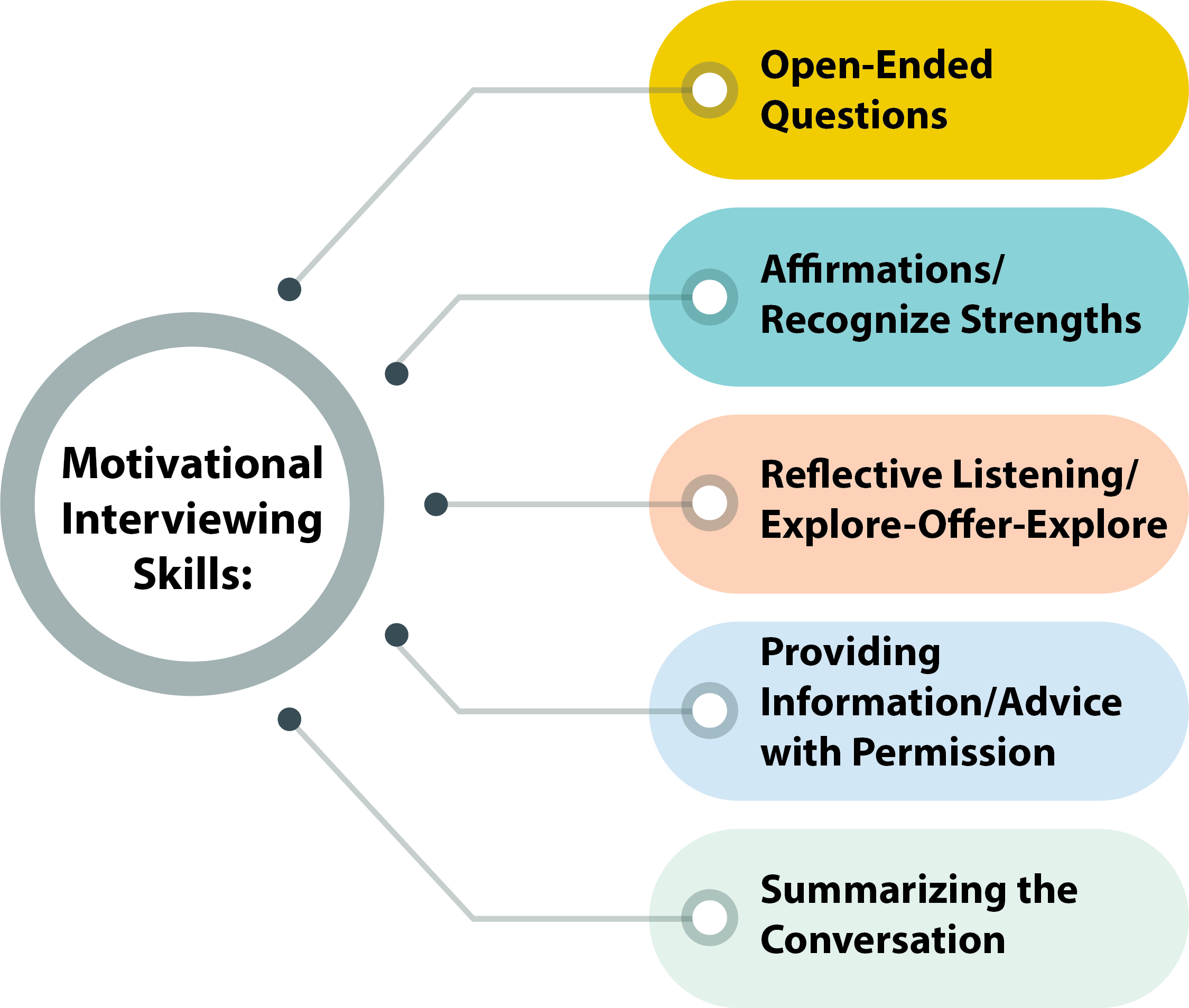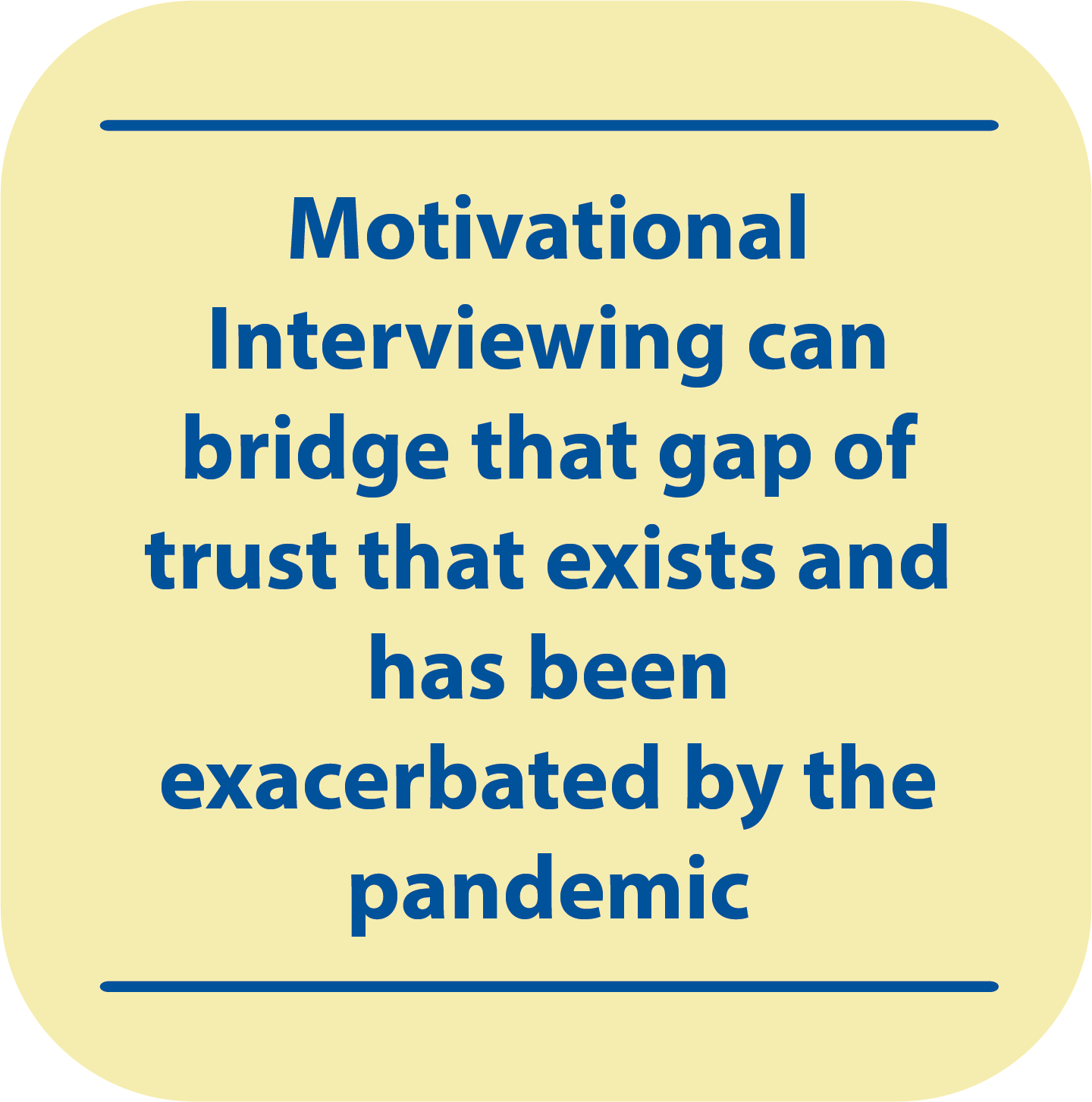Improving Vaccine Uptake Among Nursing Home Staff Through Motivational Interviewing Techniques
Health Services Advisory Group (HSAG), the Quality Innovation Network-Quality Improvement Organization (QIN-QIO) for Arizona and California, started working on Motivational Interviewing in the spring of 2021 as a tool to help nursing homes improve uptake of the COVID-19 vaccine.
Slow vaccine uptake at nursing homes has been identified as a key challenge. Given that, how did you choose Motivational Interviewing as a technique to help overcome vaccine hesitancy?
We heard from nursing home administrators that in their one-on-one conversations with staff, resistance to the vaccine was not always what they anticipated. For example, it might have been due to concerns about getting childcare or time off if they had side effects from the vaccine.
Before we started using Motivational Interviewing, we conferred with experts in the field and drew from the lessons in the "Invest in Trust" research that came out in early 2021 -- just after the vaccines started rolling out -- and focused on building vaccine confidence. A central finding of this research is that most staff lacked trust in their management.
How did you frame this outreach?
Motivational Interviewing can bridge that gap of trust that exists and has been exacerbated by the pandemic. Having these conversations allows staff the opportunity to share their concerns in a non-judgmental manner. This is also important in creating psychological safety in the workplace; another concept we have been hearing about since the pandemic began.
Motivational Interviewing helps individuals identify the conflict they have within themselves, offers options, and then supports their choices and goals. The central focus is connecting at the individual level, and not making assumptions about why someone may feel or act the way they do. This allows nursing home leadership to think more empathetically toward the individual and bridge the trust gap.
How have you implemented Motivational Interviewing to overcome vaccine hesitancy?
We started by talking with nursing home administrators about what was successful. Then we used our team’s behavioral health background and Motivational Interviewing expertise to develop educational resources and training, including role-playing exercises with scripts that guided open-ended conversations with staff and residents.
We hosted a webinar that introduced Motivational Interviewing elements and included tools such as a role-play script, an interviewing tip sheet, webinars, and case studies with more vaccine resources posted to HSAG’s website. We continue to promote Motivational Interviewing in weekly infection prevention and control meetings and through partner organizations that include the information in their established outreach channels.
To improve uptake on the vaccine booster, HSAG staff meet weekly with individual nursing homes, disseminate resources, and offer additional technical assistance. We provide role-playing scripts to nursing home administrators to quickly implement Motivational Interviewing and provide a structure to navigate those conversations. We also promote the idea of peer ambassadors and encourage nursing homes to train them in Motivational Interviewing. If a CNA is going to be a peer ambassador, we want them to be educated in how to do this.
In addition to residents, we trained the leadership of a nursing home corporation about Motivational Interviewing about how to promote it among their nursing home staff. We proactively initiated this work because we knew a lot of their facilities had low vaccine acceptance. We found that we needed to reach leadership first and get their buy-in to support this approach with front line staff.
It seems building and supporting vaccine champions is essential. Is that correct?
Yes, we found that we need to reach leadership as champions and give them the tools to implement Motivational Interviewing. Otherwise, it won’t trickle down to the frontline staff. If a nursing home administrator is a champion, there will be higher staff vaccination rates.
What advice would you give other teams about overcoming vaccine booster hesitancy?
Motivational Interviewing is a process. It is important to keep the communication open to build trust and make it safe for staff to express any hesitancies. It can help mitigate that pressure staff and administrators are feeling. It helps the individual identify what is most important to them to connect that goal to what is important.
What lessons learned can you share?
When having a conversation, ask open-ended questions and ask permission to share information (and data). People are overwhelmed with vaccine messaging. If they don’t want it, they are not going to listen. It’s about making sure people feel they are part of the conversation. Always say "thank you" after you have the conversation and leave the door open for future conversations.
We encourage nursing homes to track conversations and continue to follow up with staff. Even when there are vaccine mandates, there is still a value in having this conversation, showing empathy, and connecting with individuals.
There will be regional and local differences in the climate and receptiveness to the vaccine, and technical assistance will need to be adapted to the regional and local conditions. Staff turnover rates are high, both for systemic and Covid-19 pandemic-related reasons. Everyone needs support. Using Motivational Interviewing can help you be purposeful in your communication, build trust, improve psychological safety, and set the stage for an open relationship. These are all tools that will be useful throughout the current Covid-19 pandemic and beyond.
Key Principles and Skills for Implementing Motivational Interviewing
Follow these key principles to encourage successful Motivational Interviewing among your nursing home staff:
- Express Empathy: Walk a mile in their shoes, allowing the person to be heard and understood.
- Support Self-Efficacy: Focus on previous successes and highlighting skills and strengths already possessed.
- Roll with Resistance: Resistance is normal with conflict between the problem and solution. No need to power struggle. It is a conversation dance not a conversation wrestle. Avoid arguing.
- Develop Discrepancy: When there is recognition of a conflict between values or goals and current behavior choice, there is usually increased motivation to make changes.
Practice these skills as part of your approach to implementing Motivational Interviewing:

- Open-Ended Questions: Ask open-ended questions that will likely lead to change talk.
- Affirmations/Recognize Strengths: Ask about guiding values. Does getting vaccinated support or interfere with the person’s goals/values?
- Reflective Listening/Explore-Offer-Explore: Ask for pros and cons (good things/not-so good things) for both not getting vaccinated and for getting vaccinated.
- Providing Information/Advice with Permission: Explore what they already know and their experience. Then, offer information and explore their response to the information.
- Summarizing the Conversation: Communicate understanding, include important elements of discussion, and ask for clarification to explore what their next steps might be.
Download HSAG’s Key Principles and Skills for Implementing Motivational Interviewing Tip Sheet.
Additional Resources
- Invest in Trust: A Guide for Building COVID-19 Vaccine Trust and Increasing Vaccination Rates Among CNAs
- COVID-19 Vaccine Access Guide
- Conversation Guide to Improve COVID-19 Vaccine Uptake
This material was prepared by The Bizzell Group (Bizzell), the Data Validation and Administrative (DVA) contractor, under contract with the Centers for Medicare & Medicaid Services (CMS), an agency of the U.S. Department of Health and Human Services (HHS). Views expressed in this material do not necessarily reflect the official views or policy of CMS or HHS, and any reference to a specific product or entity herein does not constitute endorsement of that product or entity by CMS or HHS. 12SOW/Bizzell/DVA-1136-07/18/2023




